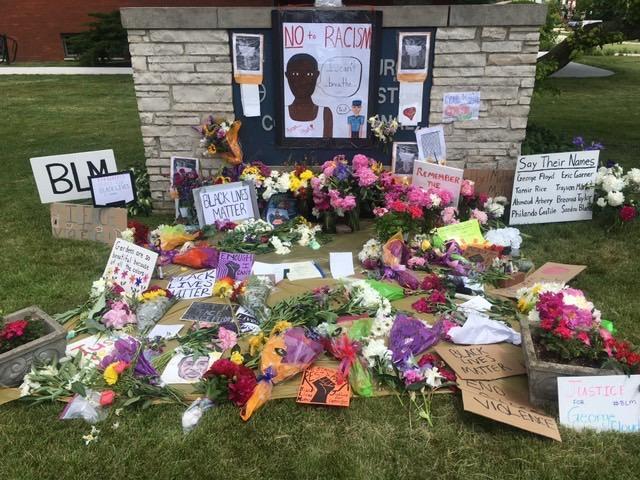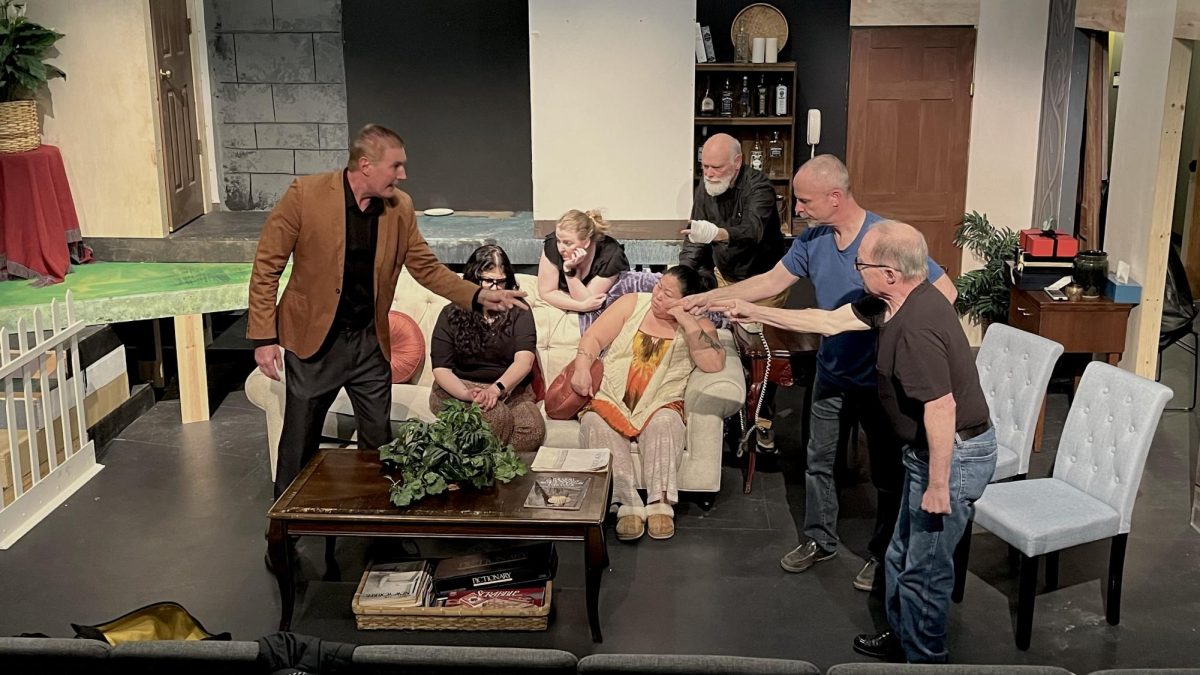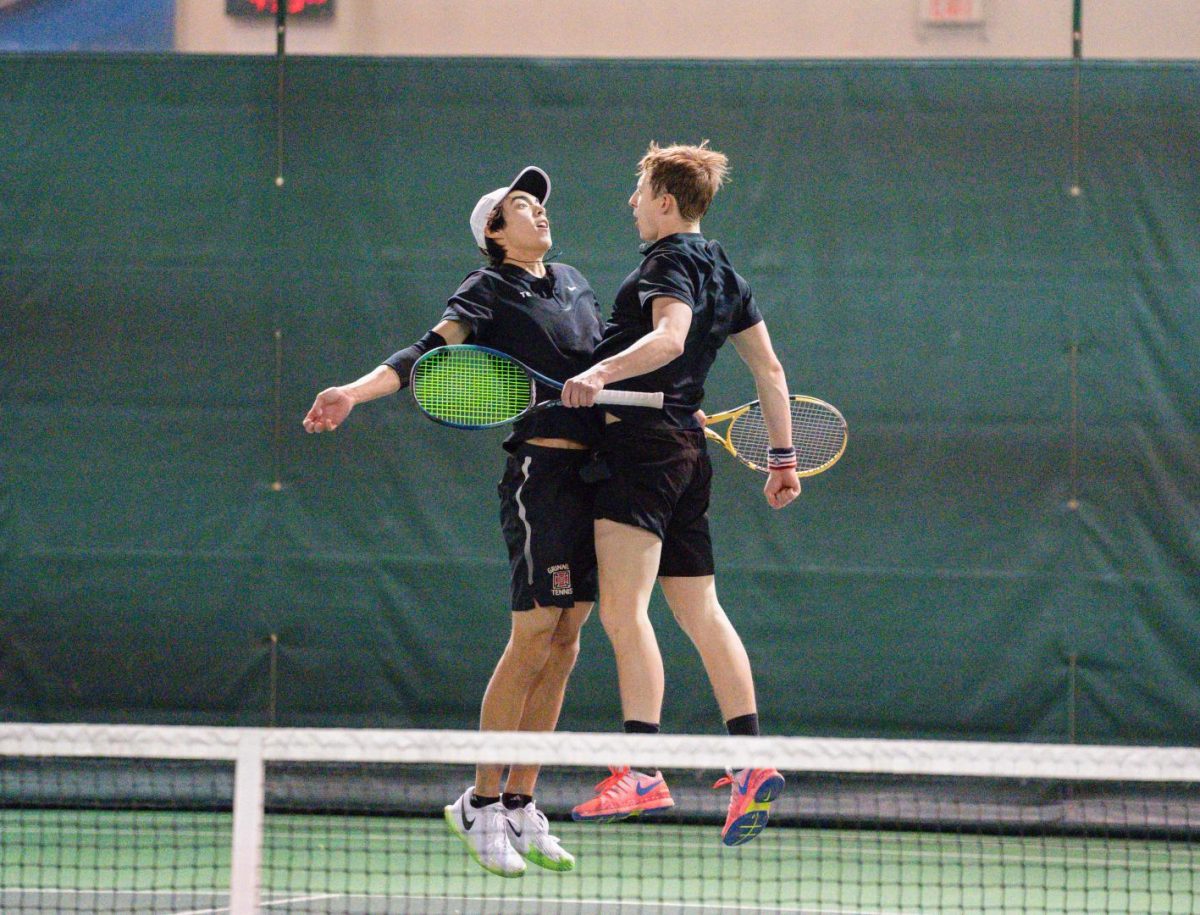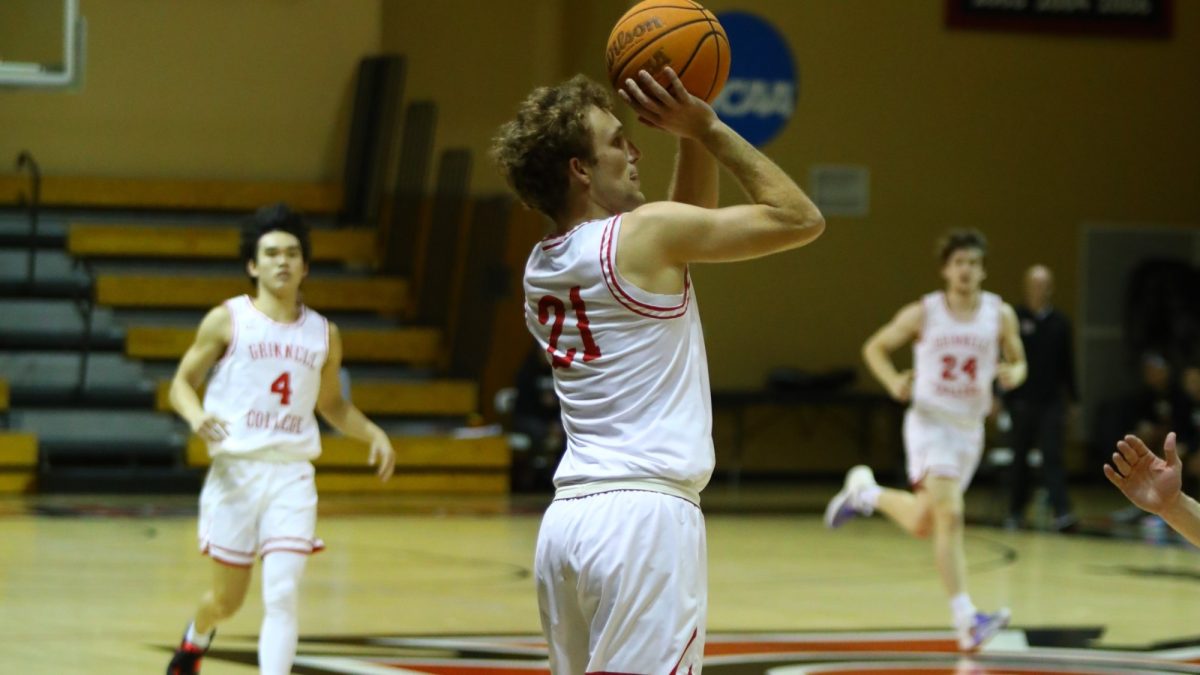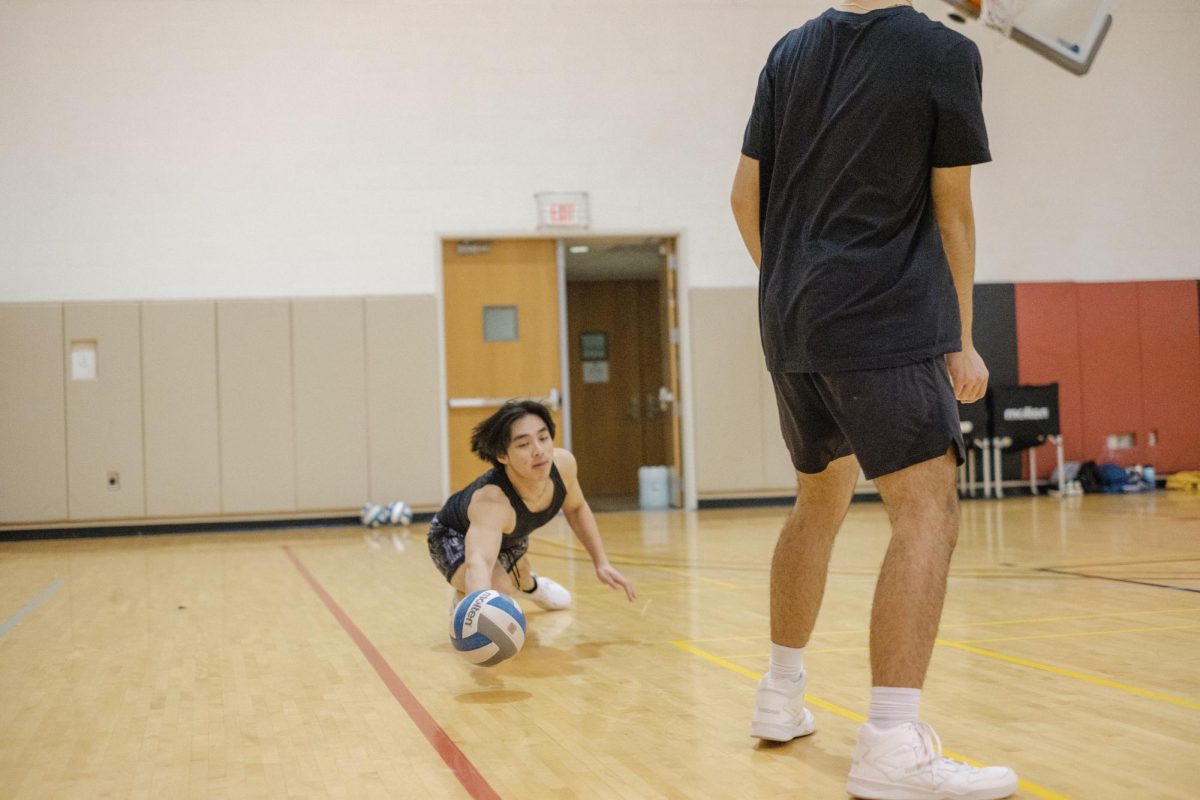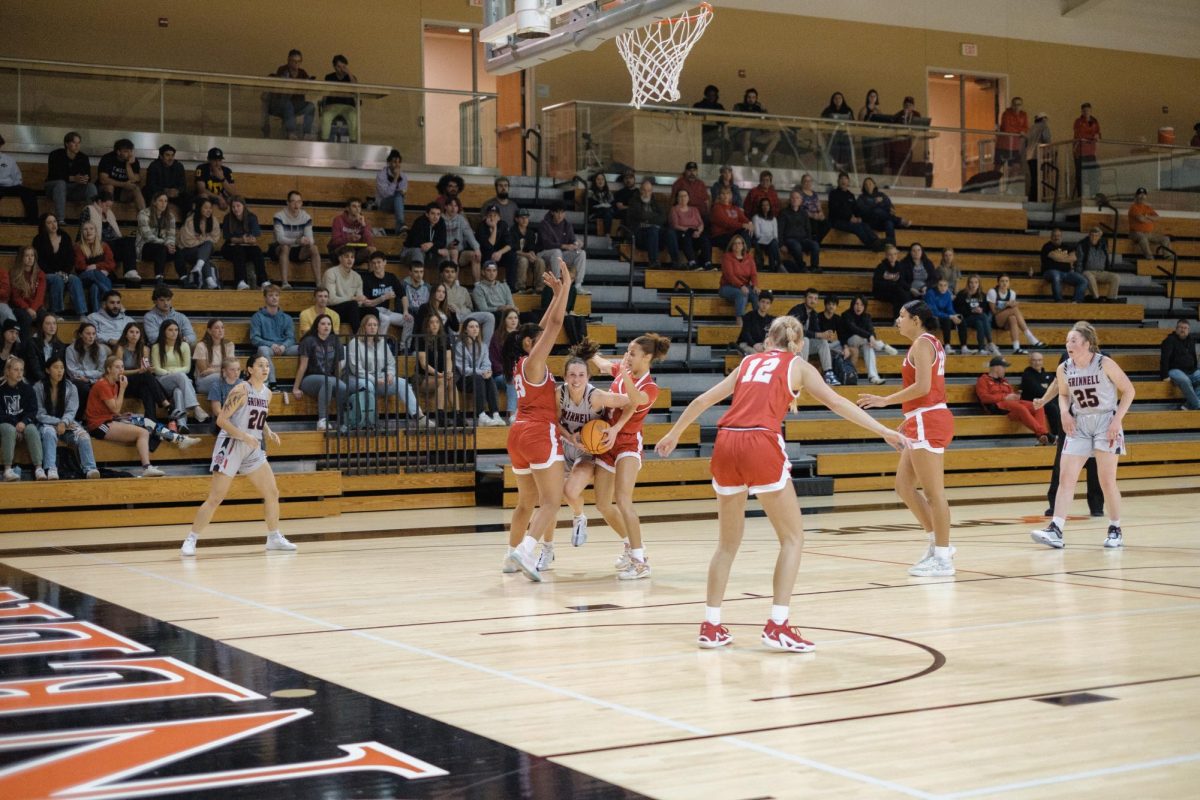The Grinnell community came together this week both in person and virtually to honor George Floyd and other victims of racist violence in solidarity with the Black Lives Matter movement. A diverse and global group of organizers in alignment with the movement have been leading historic protests against systemic racism and police brutality in the thirteen days since Minneapolis Police Department officer Derek Chauvin killed George Floyd.
On Sunday, June 7 at 1 p.m., over 70 Grinnell community members logged on to a virtual vigil organized by Dr. Kesho Scott, professor of sociology and American Studies and an internationally known diversity trainer and consultant, in collaboration with the Grinnell United Church of Christ (UCC). The UCC hosted the event on the videoconferencing platform Zoom and a recording of the event is available on their Facebook event.
The majority of attendees were affiliated with the College, according to Lily Hamilton ’19, a Grinnell resident and volunteer for the vigil.
In the invitation to the event, distributed throughout Grinnell Facebook groups and via e-mail between community members, Scott and the UCC invited Grinnell residents to participate by sitting on their front yard or their front porch for the duration of the vigil “in honor of victims of racial violence and in mindful reflection of how each of us can play a role in dismantling white supremacy.”
The UCC’s lead organizer, Erin Bustin, arranged for a group of volunteers to bike around town, serving as “guardians” to ensure the safety of volunteers and participants during the event. They also took photos and handed out anti-racist resources.
The vigil itself lasted just over half an hour. Three young Grinnell community members spoke from prepared pieces along with Scott.
The first speaker was Mezekerta Tesfay, a 2019 graduate of Grinnell High School and current student of Beloit College with a disciplinary interest in sociology and social justice. Tesfay is Scott’s daughter. In a speech entitled “You Break a Black Child’s Heart,” Tesfay recounted her own awakening to systemic racism and police brutality through personal experiences with white people in her life and through the killings of Trayvon Martin, Eric Garner, Tamir Rice, the Charleston Nine, Sandra Bland, Alton Sterling and Philando Castile.
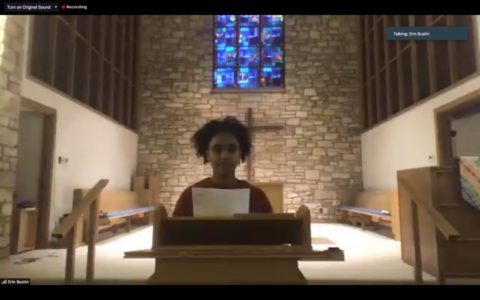
“Black children aren’t born with a blank slate. Black children are born with generational trauma that the world isn’t working to change or undo,” Tesfay said in her speech. “If you’re shocked by this information, because Black children … that you know seem so intelligent, wise, kind and comfortable, I can assure you they were performing for you.”
The second speaker was Riley Osborne, a 2019 graduate of Grinnell High School and current student of international relations at Lawrence University, who read from her piece “Fighting for Social Justice with Our Whiteness.”
“I’m speaking to all the white people in this community when I say how we speak about this moment in time is a reflection of how we value the Black people in our lives: our coworkers, our friends, our neighbors, our classmates, our family,” she said.
Osborne encouraged her white community to be conscious of the focus of their conversations during this time of national reckoning with racist systems. She urged white listeners to consider, “What is the goal?” if not to protect Black lives.
The final speaker was Maya Phelps, a 2020 graduate of Baxter High School who will be attending Washington University in the fall as an intended political science major. She emphasized the need for her white-dominated community in Grinnell to initiate changes at the grassroots level instead of allowing silence and fear to prevail.
“I challenge you to overcome your discomfort and promote accountability. … Challenge your authorities, challenge your families and challenge your friends to start their own personal revolution,” Phelps said.
Scott concluded the program by reminding attendees that this moment was only the beginning of anti-racist work, and that it was up to the participants to educate themselves and use their privilege as members of an elite institution to take action against systemic racism. After she spoke, John Scott closed the vigil with a song: “We Will Be Marching.”
Grinnell College has not yet made an official statement to the student body about actions the administration will be taking to combat racism within the institution; nor has it undertaken a financial pledge to benefit racial justice organizations like the one announced by peer institution Macalester College on June 6.
In a special campus memo sent out on June 3, the administration directed students to revisit Reverend Martin Luther King Jr.’s “Remaining Awake During a Revolution” speech, delivered on the Grinnell College campus only six months before his assassination in April of 1968. President Raynard Kington and Dean Anne Harris also addressed the Grinnell community in respective virtual letters, both mainly focusing on the link between education and “changing the world.”
The memo also invited students living in Grinnell to attend another event hosted by Scott on Wednesday, June 3, the day the email was sent. This earlier event was the creation of a public memorial for George Floyd, also done in collaboration with the UCC.
At noon on Wednesday, over 50 Grinnell residents, including several students, faculty and staff of Grinnell College, gathered masked and socially distanced outside the UCC, at the intersection of Broad Street and Fourth Avenue. For several minutes, everyone at the site knelt in a sign of respect towards Floyd’s family and solidarity with protesters, as those with flowers, signs, or hand-made posters and placards went up to the makeshift memorial one by one to make their contribution.
Scott announced that the memorial would stay up until Sunday, June 7, and encouraged everyone to return to the site with friends and family to make more contributions and take some time for self-reflection, adding that “there is no hierarchy in activism.”
Bustin coordinated volunteers to make signs for those who wanted signs but couldn’t make them themselves and maintain the memorial site at the UCC. Scott said that she and the UCC had requested that a patrol team from the Grinnell Police Department be stationed at the site to prevent any sort of vandalism.
This collaboration between the organizers and police department is in stark contrast with many other Black Lives Matter organizers’ demands to defund and/or abolish the police, speaking to the diversity of ideologies within the broader movement for Black lives. On June 7, the Minneapolis City Council announced their commitment to disband the city’s police department following over a week of protests.
At the George Floyd Memorial outside the UCC, the overwhelming majority of placards indicated solidarity with Black lives, voices and bodies as opposed to police abolition.
“This is your memorial,” Scott told the attendees. “Treat it like your own.”
The S&B has reached out to Dr. Kesho Scott for comment on this article and will update the article with her comments.



















































